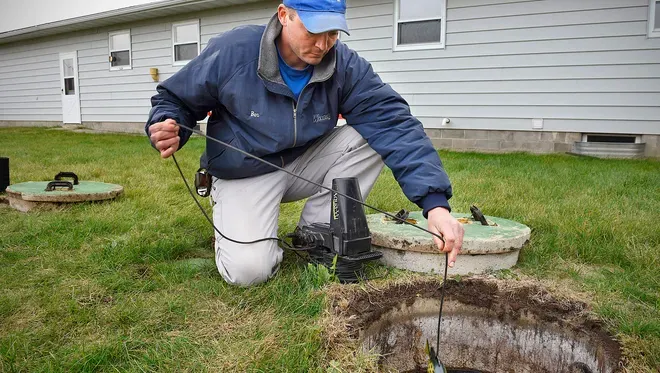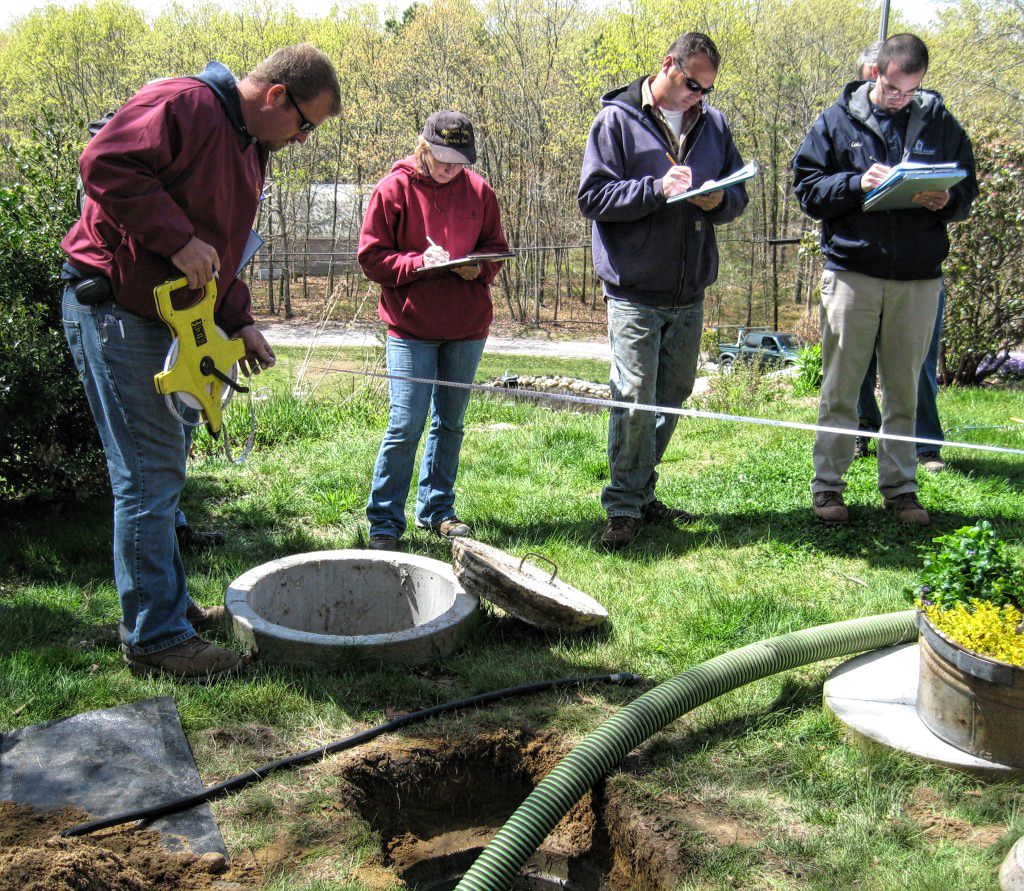A septic system is an essential component of a residential property, responsible for the collection, treatment, and disposal of waste. Understanding its functionality and the necessity for regular inspection can significantly contribute to maintaining the overall condition of one’s home. This article titled ‘Septic Inspection’ seeks to provide a comprehensive guide on how to inspect and maintain this vital system effectively. The information contained herein will serve as an invaluable resource that aids homeowners in navigating the complexities associated with septic systems.
The discussion begins by explaining the structure and operation of a typical septic system before delving into preparations necessary ahead of an inspection process. Subsequently, it systematically outlines how inspections are carried out while shedding light on potential issues that may be identified during this routine examination. It also offers post-inspection recommendations which include maintenance tips designed to ensure longevity and optimal performance of these systems. Lastly, guidance is provided on selecting professionals who can efficiently carry out these inspections, reinforcing that expertise plays a crucial role in ensuring effective maintenance of septic systems. By imparting this knowledge, homeowners will be better equipped to manage their properties with increased confidence and proficiency.
Understanding the System
Understanding the system during a septic inspection involves evaluating the condition and functionality of various components such as the tank, drainfield, and baffles to ensure they are operating optimally. This process of septic system evaluation is an integral part of ensuring that waste management in a property is handled effectively. Insight into how these elements function collectively provides valuable information regarding their current sell my house fast Fort Worth state and any necessary interventions needed for optimal operation. By examining these components meticulously, potential issues can be identified in advance, thus preventing costly repairs or replacements in future.
Septic inspection importance cannot be overstated as it not only ensures proper functioning but also extends the lifespan of the system. It offers homeowners an opportunity to learn about septic tank maintenance tips which can prevent common problems like blockages and overflows from occurring. The practice aligns with obtaining a septic system certification which attests to its excellent working condition and adherence to local health standards and regulations. For home sellers, a certified septic inspection adds value by providing potential buyers with assurance about the quality of waste management systems installed.
A thorough understanding of the system sets up for appropriate actions prior to conducting an actual inspection. Pre-inspection preparations involve activities such as documenting previous maintenance records, checking for obvious signs of malfunctioning like unpleasant odors or standing water around the drainfield area among others. These activities provide critical insights on what areas need more focus during subsequent inspections thereby optimizing efficiency while ensuring all aspects are covered comprehensively. This sets a seamless transition into preparing for direct observation methods used in septic inspections.
Pre-inspection Preparations
Prior to the evaluation of a home’s waste disposal system, certain preparations must be undertaken to ensure an efficient and accurate assessment. These pre-inspection preparations are pivotal in identifying potential issues that might affect the septic system’s functionality. An inspection can reveal problems with the tank, drain field, or other components of the system that could prove costly if not addressed promptly. This is particularly important when conducting a home inspection for sell my house fast Texas selling purposes as it helps in ensuring a smooth home sale process.
The property evaluation checklist should include items such as locating and uncovering the septic tank lids for easy access by the inspector, pumping out the septic tank prior to inspection (if required), testing all plumbing fixtures to verify they are draining into the system properly, and checking for signs of back-up or leakage. Here is an example table summarizing these key points:
| Pre-Inspection Preparation | Importance |
|---|---|
| Locate and Uncover Septic Tank Lids | Facilitates easy access for inspection |
| Pump Out Septic Tank (If Required) | Allows for detailed examination of tank interior |
| Test All Plumbing Fixtures | Validates proper drainage into septic system |
| Check For Signs Of Back-Up Or Leakage | Identifies potential issues early |
Being thorough during this preparatory phase can facilitate a quick resolution of any identified issues and contribute significantly towards efforts to sell house quickly with proper inspection. It allows potential buyers to have confidence in their investment while reducing uncertainty about potentially expensive repairs post-purchase.
This preparation serves as a critical foundation upon which an effective septic inspection is built. Once these initial tasks have been completed accurately, attention can then shift towards conducting a comprehensive examination of both visible features and hidden aspects of the waste disposal system—an essential component in determining overall property health known as ‘inspection process’.
Inspection Process
An in-depth evaluation of the waste disposal system is then initiated, encompassing both visible and concealed components, to determine the overall health and functionality of the property’s sewage management infrastructure. This inspection process is a key component on any real estate presale checklist, ensuring that potential buyers are aware of all aspects of the property’s sanitation facilities. The inspection includes evaluating pipes, leach fields or seepage pits, distribution boxes or dosing chambers, tanks and any other relevant parts of the system. It also involves checking for signs of leakage or overflow as well as testing pumps and alarms if available.

The inspection process not only ensures compliance with local regulations but also contributes to home selling tips and tricks by identifying areas for improvement before listing a property. A comprehensive septic inspection can reveal issues that may otherwise be overlooked in favor of more visually appealing aspects like boosting curb appeal for quick sales. However, prospective buyers appreciate this thorough approach as it provides them with a realistic picture of what they are investing in. Furthermore, addressing these concerns beforehand can serve as significant property value boosters by demonstrating responsible ownership and maintenance practices.
Presale home improvement ideas often focus on cosmetic upgrades but neglecting essential systems such as septic can lead to damaging consequences post-sale. Ensuring a functioning waste disposal system through an exhaustive septic inspection helps prevent such scenarios while enhancing buyer confidence during negotiations. As the discussion progresses from understanding the importance of systematic inspections towards recognizing potential problems within this context, it becomes evident how integral these processes are to maintaining efficient waste management systems over time.
Identifying Issues
Identifying potential problems within the waste disposal system plays a crucial role in maintaining efficient sanitation facilities and preventing future costly repairs. The septic inspection process provides an avenue for identifying such issues, taking into account various factors that may affect the performance of the system. These include aspects like tank condition, drain field functionality, and even how fast house sale strategies could potentially impact the overall health of a septic system.
- Tank Condition: Inspectors assess the condition of the tank by checking for cracks or leaks which might compromise its ability to hold waste materials effectively.
- Drain Field Functionality: This involves assessing whether liquid waste is properly absorbed into the ground from your drain field or if there are signs of surface pooling.
- Fast House Sale Strategies: The speed at which houses are sold can have implications on septic inspections as rushed transactions might not allow ample time to thoroughly inspect and address any prevalent issues.
- Maintenance Records: Checking past maintenance records helps establish how well a septic system has been maintained over time; neglect could result in hidden problems that manifest after purchase.
The inspection process aims to provide homeowners with valuable insights about their systems’ current state and any necessary interventions needed for optimal functioning. It helps ensure that they do not fall victim to severe damages resulting from neglected issues, especially in cases where fast house sale strategies have been employed without proper due diligence on the part of both parties involved in property sales transactions.
By identifying these issues early on during an inspection, it allows for timely action towards rectification measures before escalating into more complex problems requiring extensive repair work or even total replacement of components within the system. Such proactive measures inevitably lead towards more informed decisions when considering post-inspection recommendations for effective system management or upgrades if deemed necessary by professionals who carry out these assessments meticulously based on their expertise and experience in this field.
Post-inspection Recommendations

Following a thorough evaluation of the waste disposal system, it is crucial to consider the professionals’ recommendations for optimal sanitation maintenance or necessary upgrades. These suggestions are based on careful analysis and an in-depth understanding of septic systems. They may include routine preventive measures such as regular pumping, using bacterial additives, minor repair work to existing components, or even significant modifications like replacing part or all of the septic system. Considering these recommendations seriously can help prevent future problems and reduce potential health hazards related to wastewater management.
These post-inspection recommendations can be categorized into two broad areas: preventative measures and corrective actions. The following table illustrates some common examples under each category:
| Preventative Measures | Corrective Actions |
|---|---|
| Regular Pumping | Tank Replacement |
| Bacterial Additives | Field Line Repair |
| Inspection | Drainfield Replacement |
| Proper Waste Disposal Practices | Installation of Effluent Filter |
| Water Conservation | System Upgrade |
Corrective actions typically involve more extensive work and financial investment than preventative measures but may be essential if severe issues have been identified during inspection. It is imperative that homeowners understand not only what these recommended actions entail but also why they are necessary for their specific system’s functionality and longevity.
Looking beyond these immediate post-inspection recommendations, there are additional ways to ensure the prolonged efficiency and safety of one’s septic system. This refers to broader maintenance practices that promote healthy operation over time. For instance, being mindful about what goes down the drain can significantly impact a septic system’s performance. Transitioning into this important subject matter warrants a detailed discussion on maintenance tips for preserving the function and extending the lifespan of residential septic systems.
Maintenance Tips
Following the discussion on post-inspection recommendations, it becomes essential to explore maintenance tips related to septic systems. Ensuring that a septic system is adequately maintained can extend its lifespan and improve overall functionality.
Multiple factors contribute significantly to the effective maintenance of septic systems:
- Regular Inspections: It is recommended that septic tanks be inspected every 3-5 years by a professional inspector. This facilitates early detection of potential issues, preventing more significant problems down the line.
- Pumping: The frequency at which a septic tank requires pumping depends on various factors such as its size, total wastewater generated, and the volume of solids in the wastewater. However, specialists generally advise homeowners to have their tanks pumped every 3-5 years.
- Mindful Usage: Homeowners should be aware of what goes into their system. Items that do not decompose easily like diapers, coffee grounds or cooking fats can clog up a system and cause it to fail prematurely.

Maintenance does not stop at these three points; there are several other minor actions homeowners could take for optimal performance. For instance, protecting the drain field plays an integral role in maintaining a healthy system. Activities such as planting trees too close should be avoided as roots could grow into the tank causing damage. Moreover, driving over the drain field with heavy vehicles may also lead to structural damage due to compacted soil.
The importance associated with regular monitoring and appropriate usage cannot be overstressed when discussing maintaining an efficient septic system. Nevertheless, even with all these considerations in mind, situations may arise where professional expertise becomes crucially necessary in maintaining or repairing your tank’s functionality. This necessity brings us seamlessly into our next area of focus – choosing professionals for your septic concerns.
Choosing Professionals
Selecting the right experts for addressing concerns related to your waste management system is a crucial step that should be approached with careful consideration and thorough research. The septic inspection process necessitates a high level of expertise due to its complexity and importance in maintaining environmental health. Therefore, it is essential to ensure that the chosen professionals possess sufficient qualifications, experience, and knowledge about different septic systems. Additionally, their ability to identify potential problems efficiently can prevent future issues from arising.
When selecting professionals for septic inspections, one must also consider their reputation within the industry. This can be gauged through reviews or recommendations by previous clients who have utilized their services. A well-respected professional not only ensures quality service but is also likely to adhere strictly to safety guidelines and regulations set forth by local authorities. Furthermore, the chosen professional should provide clear explanations regarding procedures performed during inspections and any necessary repairs or maintenance required afterwards.
Professionalism extends beyond mere technical skills; it includes communication abilities as well as adherence to ethical standards. Thus, an exceptional professional will exhibit transparency regarding potential costs associated with repairs or replacements discovered during an inspection. They will also respect the property owner’s wishes without compromising on delivering comprehensive evaluations of the condition of a property’s septic system. Trustworthiness is key when allowing someone access to private property; hence a reliable professional will always make certain that respectful conduct towards both people and properties are maintained throughout all interactions.
Frequently Asked Questions
What are the financial implications of a failed septic inspection?
Financial implications of a failed septic inspection may include costly repairs or replacement, potential property value decrease, and possible legal issues from environmental contamination if problems are not addressed promptly and appropriately.
Can I still sell my property if the septic system fails the inspection?
Yes, selling property with a failed septic system is feasible. However, disclosure of this information to potential buyers is legally mandated. Buyers may negotiate for repairs or reductions in the purchase price accordingly.
How long does a septic inspection certification last?
The duration of a septic inspection certification varies based on local regulations and guidelines. However, typically, it is valid for one to two years from the date of issue. It is advisable to check specific regional requirements.
Are there any health risks associated with a damaged septic system?
Yes, damaged septic systems pose several health risks. Contaminated groundwater can lead to diseases such as gastroenteritis, hepatitis and dysentery. Additionally, malfunctioning systems may release harmful gases, causing respiratory issues in some individuals.
Can I perform a septic inspection by myself or do I need a professional?
Conducting a septic inspection independently is not advisable due to the complexity and potential health risks. Hiring a professional, with comprehensive knowledge and appropriate tools, ensures accurate evaluation and safe handling of the system.
Other Articles You Might Enjoy
Shady Real Estate Tactics And How Spot Them

